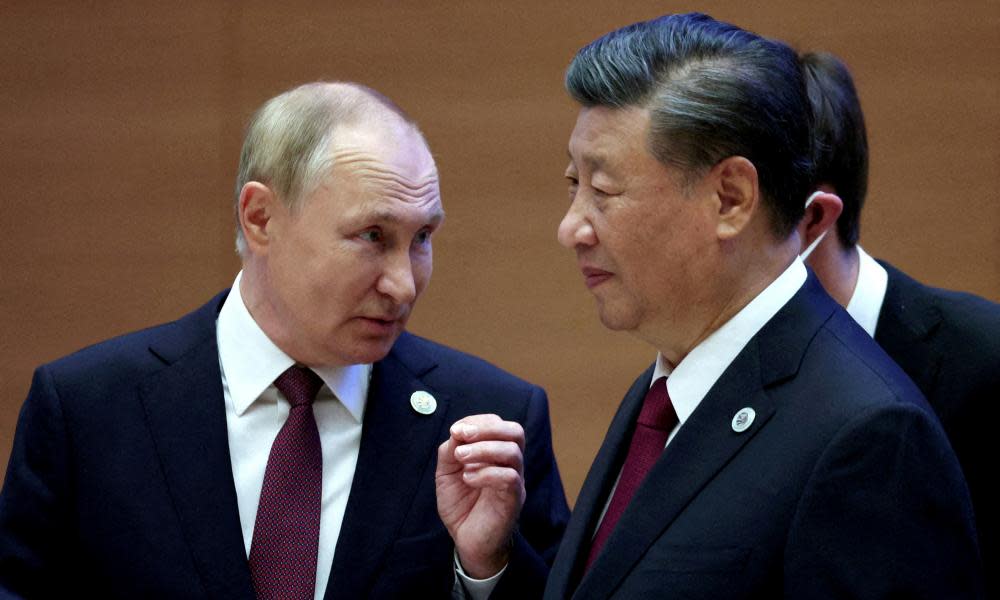The Observer view on how Xi Jinping plans to use his meeting with war crimes suspect Vladimir Putin

The welcome and overdue indictment of Vladimir Putin for war crimes allegedly committed in Ukraine confirms his position as a global outlaw. The decision by the international criminal court (ICC) is unlikely to lead to his arrest and trial in the foreseeable future. But it does ensure that, from now on, Russia’s president will be a criminal suspect and wanted man, liable to arrest in the ICC’s 123 member states and a huge embarrassment to his country.
Putin’s command responsibility for thousands of heinous war crimes committed in Ukraine has been clear from the start of the war he launched. He and his henchmen have denied any culpability. Russia does not recognise the ICC. The decision to indict Putin for the illegal deportation of children, rather than other crimes, reflects the strength of evidence in these specific cases. But additional charges should and must follow.
It is a relief that the ICC prosecutor and judges have not bowed to pressure to withhold or delay charges for fear of jeopardising a notional future peace process. Emmanuel Macron, France’s president, has argued that Putin should not be “humiliated”. But Putin has blocked peace talks and, in any event, the two issues should not be conflated. Striking an important blow for international justice, the court has shown there is no impunity for even the most senior leaders.
Like Russia (and the US), China is not a party to the ICC. But the indictment should leave its president, Xi Jinping, in no doubt about the despicable reputation of his host as he begins a state visit to Moscow this week. A more principled leader might call off his trip. But Xi, too, has blood on his hands in Xinjiang, where he stands accused of overseeing genocide and crimes against humanity. In any case, Xi’s reasons for visiting are essentially self-interested.
Xi Jinping neither wants Putin defeated, nor a Russian success. An ongoing struggle that depletes the US best suits his purposes
This week’s apparent confirmation of a “no limits” Sino-Russian friendship will be portrayed in some quarters as a boost for Putin. Yet it’s plain who is the dominant partner in an increasingly dysfunctional relationship. Xi will offer continued economic cooperation and diplomatic support – and refuse to condemn the Ukraine invasion. But he is unlikely to provide all the weapons Putin desperately needs, for fear of being sucked directly into the conflict.
Beijing seeks to portray itself as an honest broker. Yet its stance is not credible, as shown by its absurdly one-sided “peace plan”. Xi does not want Putin to be defeated. The ensuing instability would not be in China’s interest. Equally, he does not want a big Russian success that might reverse its growing subordination to Beijing. An ongoing struggle that distracts and depletes the US, China’s main challenger, and which divides Europe and Nato, best suits Xi’s purposes.
Xi’s overarching aim is to advance his claim to lead an alternative, non-democratic, illiberal world order, supplanting the US-dominated status quo and UN-endorsed rules-based system. The recent unconvincing Chinese-brokered deal between Saudi Arabia and Iran was hailed by Beijing as an example of how its supposedly disinterested approach brings results. Xi also hopes to win over European leaders, particularly in France and Germany, who want an end to the war and a close trade relationship with China.
Like Richard Nixon’s visit to Beijing in 1972, when he famously played the “China card” against the Soviet Union, Xi is using his Russian alliance to weaken and thwart the US. A smarter, stronger leader than Putin would understand Xi’s game. But Putin is neither smart nor strong – and the tacit message to Russians from the ICC indictment is that his days in power are numbered.

 Yahoo News
Yahoo News 
